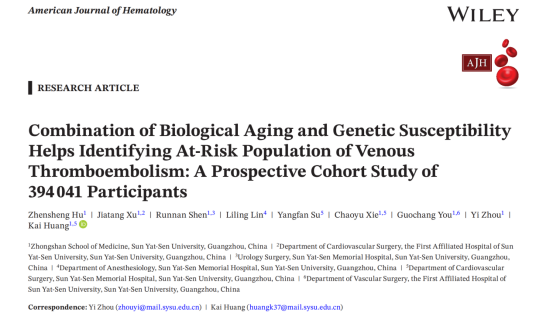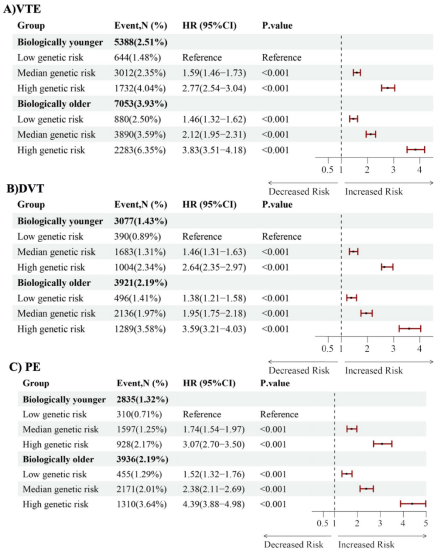American Journal of Hematology | Professor Huang Kai/Zhou Yi's team developed a new model for the recognition and prevention of thrombotic diseases based on multi-source data
Venous thromboembolism (VTE), which includes deep vein thrombosis (DVT) and pulmonary embolism (PE), has become one of the top three fatal cardiovascular diseases worldwide. Although age is a known risk factor and has been incorporated into several VTE risk scoring systems, an individual's social age often fails to reflect their true physical functioning, resulting in inaccurate VTE risk assessments. In recent years, research has shown that the acceleration of "biological age" is a more precise factor affecting the occurrence of various diseases. Therefore, the joint team is the first to propose the inclusion of "biological age" in the risk assessment of VTE to achieve more accurate prevention. At the same time, considering that VTE has a genetic tendency, the estimated heritability is as high as 50%. At present, the frontier view is that genetic risk of disease can be affected by environmental factors, so whether biological aging will change an individual's genetic risk of VTE needs to be studied.
Recently, A joint team led by Professor Kai Huang of Sun Yat-sen Memorial Hospital, Sun Yat-sen University, and Professor Yi Zhou of Sun Yat-sen Medical College published an online paper entitled Combination of Biological Aging in the American Journal of Hematology (IF=10.1), a Top journal of the first district of the Chinese Academy of Sciences and Genetic Susceptibility Helps Identifying At-Risk Population of Venous Thromboembolism: A Prospective Cohort Study of 394 041 Participants. Based on blood biomarker data, this study innovatively develops a new thrombus risk recognition model -- VTE PhenoAgeAccel. This model can accurately predict the risk of thrombus by quantifying the biological aging rate of individuals. Compared with traditional methods, the VTE PhenoAgeAccel model can better reflect the dynamic changes in the risk of thrombosis, and can provide individuals with a more personalized and timeliness risk assessment based on the relationship between biological aging and thrombosis. In addition, based on whole genome sequencing data, combined with the latest genetic informatics methods, the study constructed a VTE genetic risk score to quantify an individual's genetic susceptibility. By integrating blood biomarkers, genomic data, and biological aging models, this study demonstrates the innovative application of medical informatics in multi-level, multi-data source risk assessment, providing a new data-driven solution for early identification and personalized prevention of thrombotic disease.

Studies have shown that accelerated aging will promote the occurrence of VTE, and people with premature aging are more likely to suffer from VTE. People with high genetic risk had significantly higher relative risks of VTE, DVT, and PE than those with low genetic risk. The combination of biological aging and genetic risk can improve the effectiveness of VTE risk assessment, and the combination of the two has a synergistic effect on the increase of VTE risk. Based on this, the team has transformed the model into a clinical diagnostic tool to provide precise strategies for ultra-early identification of people at high risk of thrombosis. Physicians can track an individual's diabetes progression, hematological markers, and genetic risk, providing a scientific basis for personalized treatment and health management.

Kai Huang, Professor of Sun Yat-sen Memorial Hospital, Sun Yat-sen University, and Yi Zhou, Professor of Sun Yat-sen Medical College are co-corresponding authors of the paper. Hu Zhensheng, a doctoral student of Professor Zhou Yi, is the first author, and Xu Jiatang and Shen Runnan are the co-first authors of the paper.
Professor Huang Kai's team has long been engaged in artificial intelligence precision diagnosis and treatment, big data and disease risk spectrum identification and clinical database mining, specializing in vascular surgery diseases, such as venous embolism, major artery disease and severe vascular diseases. Professor Zhou Yi's team has long been engaged in the research of health and medical informatization and big data, medical artificial intelligence, medical large model and other related fields. Postdoctoral and graduate students who are interested in this research direction are welcome to join.
The original link: https://doi.org/10.1002/ajh.27605 or https://onlinelibrary.wiley.com/doi/10.1002/ajh.27605


